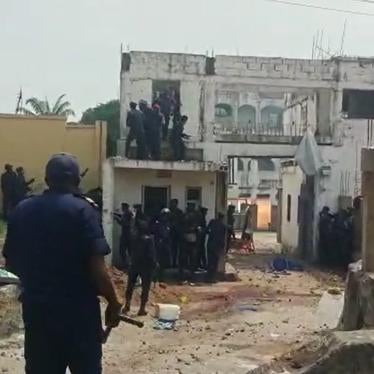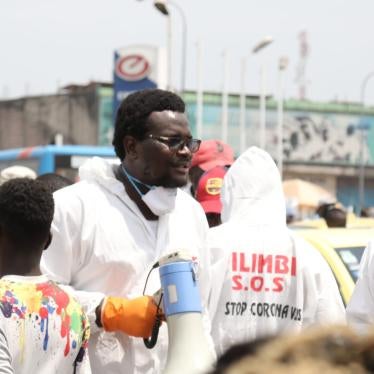To the General Manager of:
Kamoa-Kakula Mine
Chemicals of Africa (CHEMAF mine)
Metalkol RTR
Frontier Mine
Kamoto Copper Company (KCC)
Tenke Fungurume Mining (TFM)
Sino-Congolaises des Mines (SICOMINES)
Compagnie Minière de Musonoie (COMMUS)
Mutanda Mining (MUMI)
Congo Dongfang International Mining (CDM mine)
Somidez (Deziwa mine)
La Minière de Kalukundi (LAMIKAL)
La Minière de Kalumbwe Myunga (MKM)
Dear General Manager,
We are writing as a group of international and Congolese civil society organisations concerned with the measures taken by major industrial mining companies in Lualaba and Haut-Katanga provinces in DR Congo to prevent the spread of COVID-19 which could negatively impact workers’ rights. We believe that some of the measures taken to date—such as placing a mine under “lockdown” with workers confined on-site, as well as a lack of measures to prevent the spread of COVID-19 at other mining sites— raises important concerns for the protection, health and safety of workers during this period.
We recognise that there are difficult decisions to be taken in these troubled times. Nonetheless, the well-being of your workers should be paramount in any decisions taken. While there are concerns for all workers, we want to bring your attention to Congolese workers in particular, as they represent the bulk of your workforce and are likely to be the most negatively affected.
Reports from Congolese workers and non-governmental organizations working in the mining areas in recent weeks provide a troubling picture. In some mining sites where companies have pursued a policy of confinement, Congolese workers were not given adequate food and water rations, were not provided with appropriate sleeping arrangements and, in some cases, were not given a choice to accept the confinement without fear of losing their jobs or other forms of reprisal. In other mining sites, we have heard that workers do not have adequate or any PPE or handwashing facilities. Such findings are of great concern.
While it is possible that you have been, or may be, in discussion with union representatives about these concerns, as civil society we believe it is important to raise our voice to remind you of the need to fully respect workers’ rights. We believe it is vital that appropriate measures, protocols and compensation are in place to support all Congolese workers, both employed indirectly through subcontractors or directly by your mine, and their families. This should include workers who are on permanent, temporary and fixed-term contracts. More precisely, we call on you to:
For all mines:
- Honour your contracts with your suppliers, as well as with your subcontractors for Congolese personnel;
- Take measures to avoid major layoffs and retain as many employees as possible. Particular efforts should be made to retain low-skilled workers as a termination of such contracts is likely to have a disproportionate negative effect on them, and their families.
- If a temporary reduction of staff becomes necessary during this crisis, to ensure that workers will be re-hired when activities resume as normal;
- Fulfil legal obligations and provide paid leave for workers who become, or suspected to be sick with COVID-19. For temporary workers who become sick, to pay out the remainder of the contract as a gesture of humanitarian relief;
- Provide adequate Personal Protective Equipment (PPE), such as masks and gloves, to every worker during their working shift, at no personal cost, as well as hand sanitizer.
- Promote regular and thorough handwashing by all workers and persons on-site and provide facilities to do this;
- Have surfaces and objects wiped with disinfectant regularly;
- Implement social distancing measures at the mines at all times;
- Incorporate any measures taken on-site to prevent COVID-19 (social distancing, handwashing, etc.) into a formal policy, in French and Swahili, and to provide a copy to every worker. The policy, as well as posters and signs promoting these measures, should be displayed throughout the mine. It should be clear that such policy applies to all workers, contractors, subcontractors, suppliers and anyone visiting the mine;
- Assess the impacts on the rights of workers, with special attention to female personnel, of any other measures implemented at your mine in response to COVID-19.
For mines that have decided to keep operations running as usual:
- Carry out temperature checks of everyone entering the mine, without discrimination. Anyone displaying a temperature higher than 37.3℃, as recommended by the WHO, should be denied entry. [1] Those who are employees should be provided with paid sick leave as per Congolese law. Such a temperature screening process should be done in an unbiased, non-discriminatory, and neutral manner.
- Brief all workers that anyone showing known signs of COVID-19 must stay home and will not be penalized or face the loss of their job, and keep promoting this message through displaying posters on-site and other communication channels (internal radio, public announcements, etc.);
- Implement social distancing measures during transportation to and from the mine and provide additional buses or other modes of transportation if needed to ensure this is possible;
- Provide appropriate washing facilities to workers for them to be able to wash before returning home to their families;
- Ensure that the isolation period of 14 days is respected by any person on site that may have become ill before allowing them to re-enter the mine.
For mines that have decided to confine personnel on site:
- Halt any mandatory confinement policy and ensure workers are given a free and fair choice to continue commuting to work while living at home. Workers should be able to take that decision without fear of reprisal, threat, or retaliation of any kind. Employment should be maintained for those who decided to stay home.”
- Provide adequate compensation, including bonuses, to those who decide to stay on-site;
- Ensure the regulatory maximum working shift of 8 hours is respected at all times as prescribed by Congolese law, even if working with a reduced workforce. Any work above that limit should be agreed with the workers and remunerated accordingly;
- Provide adequate and sufficient food and water to all workers, at a minimum of 3 meals and 4.5 litres of water a day.[2] Workers, or their families, should not bear the cost for the food and water;
- Provide adequate sleeping arrangements, with appropriate social distancing, and individual materials (mattress, pillows and blankets), as well as washing facilities, to workers on-site. Provide separate facilities for female workers;
- Ensure workers are able to contact their family members on a daily basis at no additional cost and provide the means to conduct such communication, such as by setting up calling booths, providing phone units or similar that are adequately sanitized between each user;
- If individuals show known signs of COVID-19, provide them with transportation home for self-isolation and if transportation is necessary to a hospital or health centre, provide such transportation at no personal cost to the worker;
- Although we urge companies to halt confinement entirely, companies should ensure any continued confinement is kept to the shortest period possible, and is regularly reviewed, taking into account views from workers and/or their union representatives.
- Ensure there is regular and transparent communication about the confinement and steps taken to implement it with workers and their families.
These issues might already have been raised and/or resolved, but we encourage you and your management to maintain an open dialogue with workers’ representatives throughout this time of crisis, and beyond. It is important to remain transparent about the steps and measures taken, as well as the course of action contemplated by your mine to both workers and the general public.
We remind you that you have the responsibility to respect worker rights and the human rights of your entire workforce, whether employed directly by you or through a subcontractor, as mandated by the UN Guiding Principles on Business and Human Rights (UNGPs) and the OECD Guidelines for Multinational Enterprises. The current situation should not be used as a pretext to infringe these rights and circumvent your responsibilities.
We believe that companies around the world will be remembered by how they treat their workers during these challenging times. At a minimum, companies should not require workers to be held in mandatory confinement under threat of unemployment, should provide adequate personal protective equipment and access to water and sanitation facilities for all workers, and employ social distancing measures at all times. Additionally, going the extra mile where possible, providing humanitarian relief to those most affected, and supporting workers and their families is how we will all make it through this global pandemic. The financial and other contributions provided by some industrial mining companies to government authorities in Congo for the fight against COVID-19 assists towards this goal.
We would be most grateful if you could confirm that the measures described above are implemented and to provide details of any other actions taken by your mine to safeguard workers’ health, safety, and security. We look forward to receiving your response which can be directed to Richard Ilunga Mukena, from AFREWATCH, at info@afrewatch.org.
We also believe it is vital there is an open dialogue about these measures including the challenges you are facing as employer. We would be very willing to hold a further discussion between representatives of civil society and members of your management, which we believe can be organized through a conference call or virtual meeting. Please contact AFREWATCH at info@afrewatch.org or alternatively RAID, at raid@raid-uk.org, if you wish to arrange such a meeting.
Yours sincerely,
Amnesty International
Human Rights Watch
Rights and Accountability in Development (RAID)
Action Contre l'Impunité pour les Droits Humains (ACIDH)
Action pour la Défense des Droits Humains (ADDH)
African Resources Watch (AFREWATCH)
Cadre Provincial de Concertation de la Société Civile du Lualaba
Centre d’Assistance Juridico-Judiciaire (CAJJ)
Centre Arrupe pour la Recherche et la Formation (CARF)
Initiative pour la Bonne Gouvernance et les Droits de l'Homme (IBGDH)
Secrétariat des Syndicats IndustriALL de la CDT - RDC
Cc:
Governor of Lualaba province
Governor of Haut-Katanga province
Minister of Mines of Lualaba province
Minister of Mines Haut-Katanga province
Minister of Employment, Labor and Social Welfare of Lualaba province
Minister of Employment, Labor and Social Welfare of Haut-Katanga province
[1] World Health Organization, Getting your workplace ready for COVID-19, 3 March 2020, available at: https://www.who.int/docs/default-source/coronaviruse/getting-workplace-ready-for-covid-19.pdf.
[2] The World Health Organization recommends a minimum of 4.5 litres per day for manual labour in tropical climate, see Guy Howard and als., Domestic Water Quantity, Service Level and Health WHO/SDE/WSH/03.02, World Health Organization, 2003, available at: https://www.who.int/water_sanitation_health/diseases/WSH03.02.pdf. However, the US Occupational, Safety and Health Administration recommends 1 litre by hour worked in high temperature, see https://www.osha.gov/SLTC/heatillness/heat_index/protective_high.html








